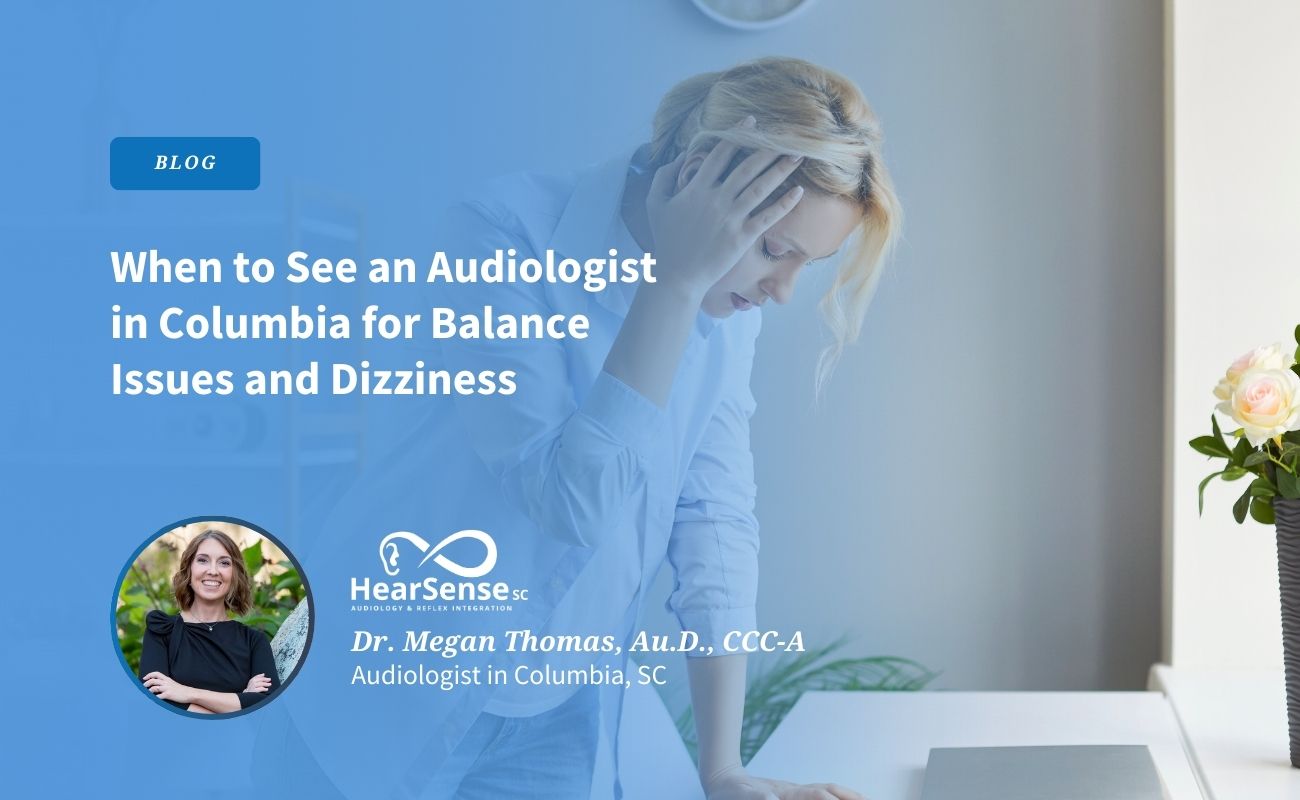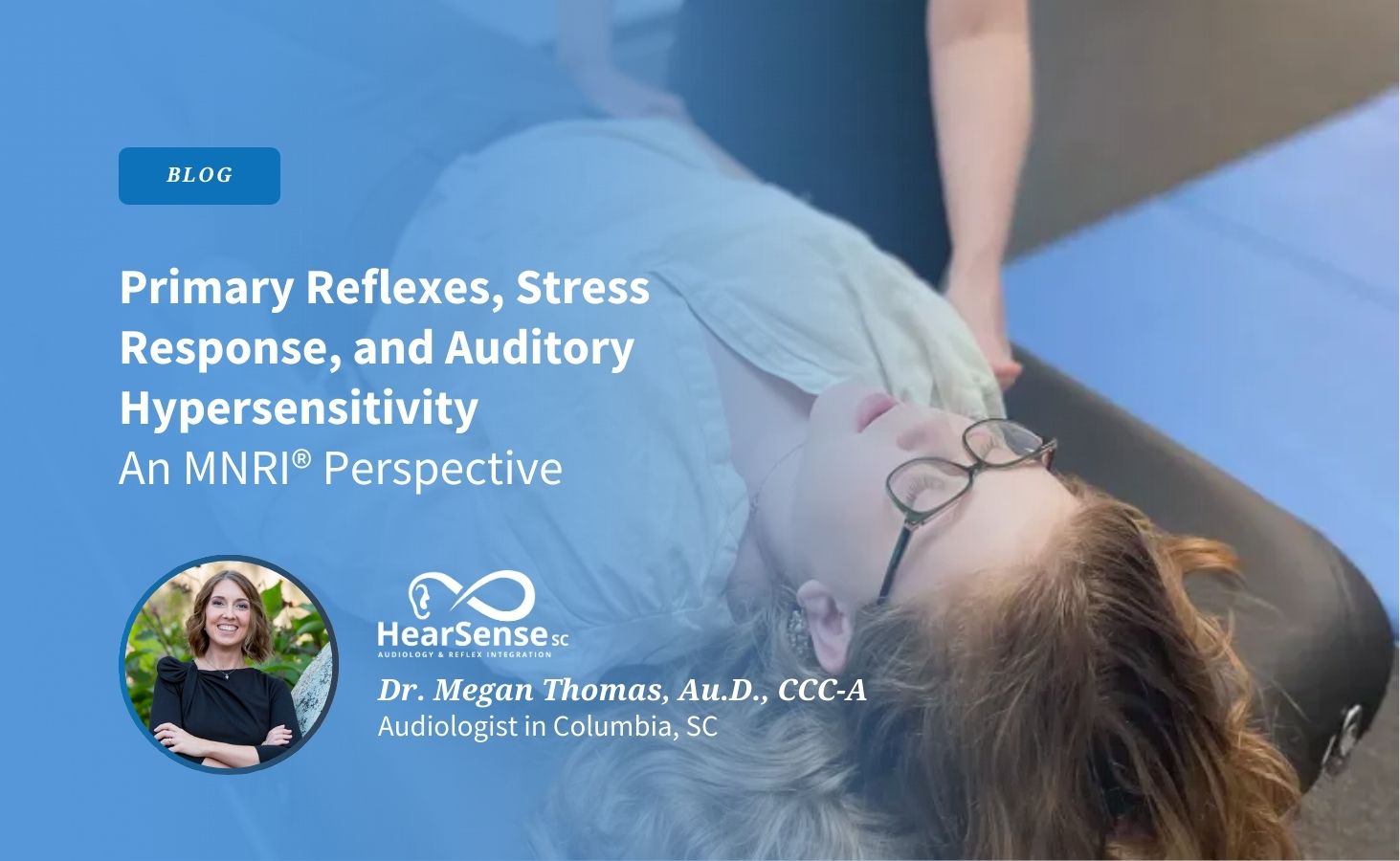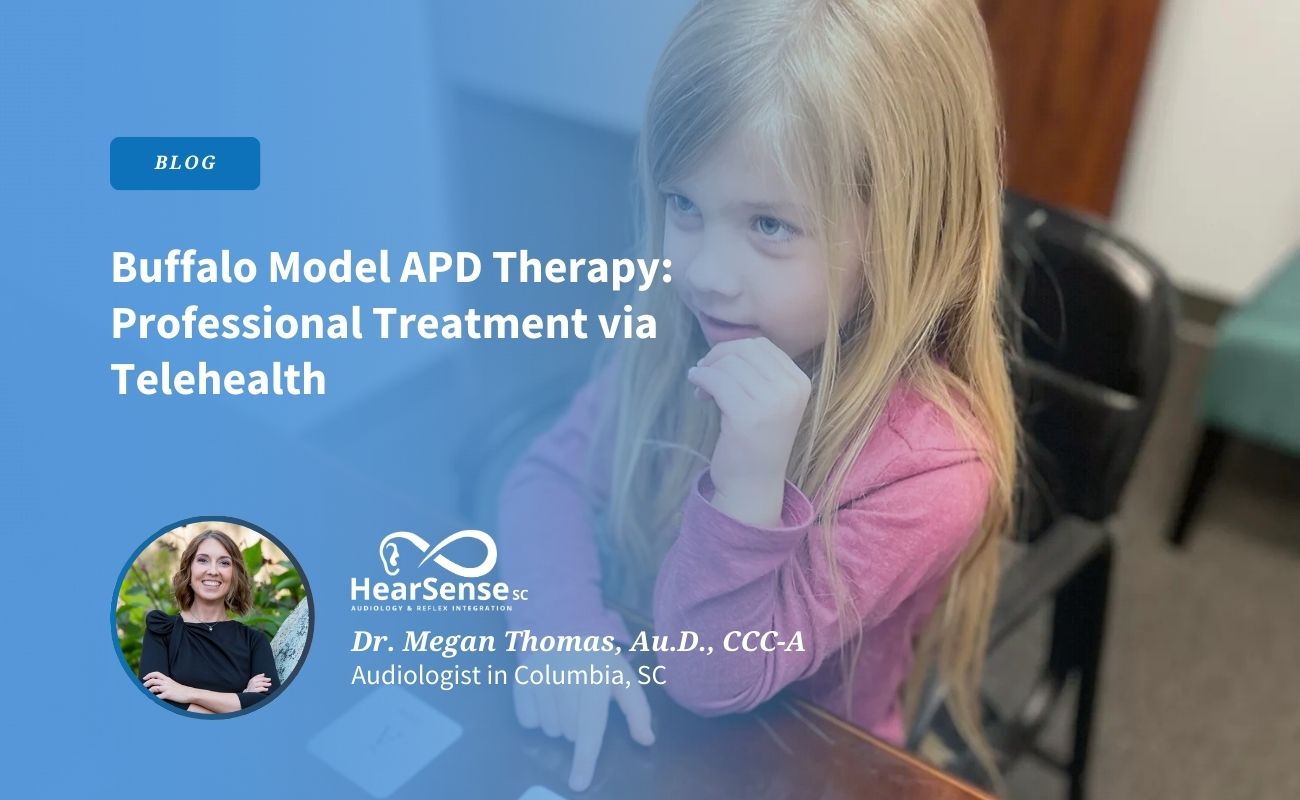What Makes HearSense SC Different from Other Audiology Practices
.jpg)
When searching for hearing healthcare in Columbia, South Carolina, you'll find many audiology clinics offering standard hearing tests and hearing aid fittings. At HearSense SC, we take a fundamentally different approach to hearing care that sets us apart from traditional practices throughout the region and beyond.
Dr. Megan Thomas's Specialized Training
Dr. Megan Thomas brings unique qualifications to our practice that directly translate to better patient outcomes. After graduating from the University of Kansas Medical Center with her clinical doctorate in Audiology, she completed her clinical rotation at the internationally recognized Boys Town National Research Hospital. Her experience in both clinical practice and vestibular research provides a comprehensive foundation for understanding complex auditory and neurological relationships.
Her additional training through the Auditory Processing Institute and extensive MNRI coursework positions her to offer treatment combinations unavailable elsewhere in South Carolina. This specialized training includes NeuroTactile Integration, Archetype Movement Integration, Visual and Auditory Reflexes Integration, and Trauma and PTSD Recovery methods.
We stay current with the latest developments in auditory processing research and treatment methods. Our commitment to continuing education ensures that patients receive the most effective interventions available. This dedication to advancement means we can offer new treatment options as they become available and refine our existing protocols based on emerging research.
Unique Service Offerings Available Nowhere Else in South Carolina
We're currently the only practice in South Carolina providing comprehensive auditory training and ARIA therapy, making us a destination for families across the Southeast seeking specialized care for APD.
ARIA (Auditory Rehabilitation for Interaural Asymmetry) therapy represents cutting-edge treatment for individuals with interaural asymmetry. This specialized approach presents different auditory stimuli to each ear, training the brain to process sound more effectively. We're proud to be the only clinic in South Carolina offering this advanced therapy, which is particularly beneficial for individuals who have difficulty understanding speech in noisy environments, struggle with localizing sound, or have a significant difference in hearing between the two ears.
Buffalo Model therapy targets the particular areas identified during evaluation, whether that's decoding difficulties, memory challenges, integration problems, or organizational issues. We offer both Buffalo Model and ARIA therapies, providing treatment options that address each individual's specific diagnostic profile. Our Buffalo Model therapy program is offered both in-person at our Columbia, South Carolina, clinic and via telehealth.
MNRI (Masgutova Neurosensorimotor Reflex Integration) method addresses the foundational reflexes that support auditory processing development. Primary reflexes, also known as primitive reflexes, develop during fetal life and infancy. When these reflexes don't integrate properly, they can contribute to developmental delays, learning difficulties, ADHD, sensory processing issues, and auditory processing disorders. By addressing these underlying neurological patterns, we can often achieve more comprehensive and lasting improvements in auditory processing abilities.
Our primary reflex check evaluates over 20 different reflexes, including the Asymmetrical Tonic Neck Reflex, Moro reflex, Spinal Galant, and many others. This thorough evaluation helps us understand the neurological foundations that may be impacting auditory processing and overall development.
Holistic Approach to Hearing Healthcare
What truly distinguishes our practice is our holistic approach that recognizes hearing involves more than just detecting sound—it requires the brain to properly process and interpret auditory information. Many individuals with normal hearing sensitivity still struggle with understanding speech, following directions, or concentrating in noisy environments. These challenges often stem from how the brain processes sound rather than the ears themselves.
While most audiology practices concentrate primarily on hearing loss and hearing aids, we specialize in the complex world of Auditory Processing Disorders (APD). Our approach recognizes the interconnected nature of auditory processing, neurological development, and overall function.
Our APD evaluation process goes far beyond standard hearing tests. We use a detailed 4-step test battery that examines four critical areas:
Integration assesses the ability to combine visual and auditory information. When this system isn't working properly, individuals often experience difficulties with reading and spelling, as the brain struggles to connect what they see with what they hear.
Tolerance Fading Memory evaluates how well someone can hear in noisy environments and retain auditory information in memory. This affects performance in classrooms, restaurants, and other challenging listening situations.
Decoding examines the auditory cortex's ability to quickly and accurately process speech sounds. This fundamental skill impacts language development and communication abilities.
Organization measures the capacity to retain and organize auditory information in the correct sequence, which affects following multi-step directions and academic performance.
Our practice works with individuals from age 4 through adulthood, recognizing that auditory processing challenges can affect people throughout their lives. Many adults discover they have APD after their children are diagnosed, finally understanding why they've always struggled in certain listening situations.
While APD treatment is our specialty, we also provide comprehensive hearing healthcare services. We offer hearing tests using the latest audiological equipment and techniques, ensuring accurate diagnosis of hearing loss when present. For those who need hearing aids, we partner with leading manufacturers including Phonak, ReSound, Widex, and Oticon. Our current hearing aid offerings include the most advanced technology available, such as the Phonak Infinio with its dual-chip AI system, the ReSound Vivia with micro-receiver-in-ear design, the Widex Allure powered by the W1 chip, and the Oticon Intent with revolutionary 4D Sensor technology.
Why Specialized Training Matters for Patient Outcomes
The combination of Dr. Thomas's specialized training and our unique service offerings directly translates to better outcomes for our patients. We've seen remarkable improvements in both children and adults who receive appropriate APD treatment. Children often show progress in academic performance, attention, and behavior, while adults frequently report reduced listening fatigue and improved communication abilities.
Our comprehensive approach addresses not just the symptoms of auditory processing difficulties but the underlying neurological foundations that contribute to these challenges. By combining auditory training with primary reflex integration, we can often achieve more complete and lasting improvements than traditional auditory processing therapy alone.
The integration of MNRI methods with traditional auditory processing therapy represents a paradigm shift in treatment approach. Rather than addressing auditory processing in isolation, we recognize that these challenges often have deeper neurological roots that must be addressed for optimal outcomes.
Our specialized training allows us to identify subtle patterns and connections that might be missed by practitioners without this background. This expertise enables us to develop more targeted and effective treatment plans that address each individual's unique combination of challenges.
Location and Accessibility Information
Understanding that families throughout the Southeast need access to specialized APD services, we offer flexible treatment options from our Columbia, South Carolina location at 115 Atrium Way # 102.
Our APD evaluations and Buffalo Model auditory therapy are available both in-person at our Columbia clinic and via telehealth to residents of South Carolina, North Carolina, and Georgia. For families who prefer virtual consultations, we've developed comprehensive telehealth protocols that maintain the same rigorous standards as our in-person services. This accessibility means that a family in Charleston, Atlanta, or Jacksonville can receive the same specialized care as someone who walks into our Columbia office.
ARIA therapy and primary reflex services require in-person treatment at our clinic, as these interventions involve hands-on techniques and specialized equipment that can't be replicated virtually.
Schedule Your Consultation Today
If you or your loved one struggles with hearing in noise, following directions, attention difficulties, or academic challenges despite normal hearing tests, we invite you to learn more about our specialized services. Our comprehensive evaluations can identify underlying auditory processing challenges and primary reflex dysfunction that may be contributing to these difficulties. Contact us at (803) 567-2533 to schedule your consultation and discover how our unique approach to hearing healthcare can make a difference in your life.
Related Articles
Read more articles
We have more information about APD, Audiology, hearing aids, hearing loss and more.

When to See an Audiologist in Columbia for Balance Issues and Dizziness

Primary Reflexes, Stress Response, and Auditory Hypersensitivity: An MNRI® Perspective


